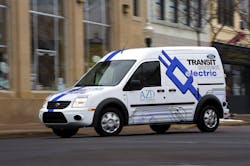Azure Dynamics, which counts Ford Motor Co. as its biggest customer, has filed for bankruptcy protection in the U.S. and Canada. The filing followed a rejection by the Ontario Securities Commission (OSC) for a public stock offering that would have raised needed capital for operations, Mike Elwood, vice president-marketing, told Fleet Owner.
“We had run out of options, so the board of directors” chose this route, Elwood added. “This is the first step to a reorganization. We’re very confident” that Azure will emerge from bankruptcy as a stronger company.
Elwood said the company hopes this process is a short-term issue. “We have a vibrant, strong order book; a good product,” he said. “Realistically, we want to turn this around quickly because we don’t want to be out of the market too long.”
Azure, which makes hybrid electric and electric powertrain solutions and supplies the system that powers the Ford Transit Connect Electric, among other vehicles, closed three of its four facilities last week, including in Oak Park, MI, as part of the bankruptcy process and laid off 120 employees, according to news reports. Elwood said the company’s lone remaining facility is at its home base in Vancouver.
“We had four facilities and our overhead was a bit taxing, but we’ve sorted all that out now,” Elwood said. “We’ve retreated back to our roots.”
At this point, Azure has stopped all production activities, leaving questions about current orders and future orders as well as support for vehicles on the road running an Azure system.
“We’re working through the logistics right now as well as [supporting] the products out there,” Elwood said. “We’re trying to work through everything so we can mitigate any [problems] and hope to have a resolution to that in the next few days.”
A Ford spokesman contacted by Fleet Owner declined any specific comment on Azure’s filing and future plans as it relates to Ford’s electric vehicle portfolio.
“Our priority is to ensure that Azure’s Transit Connect Electric customers continue to have support throughout their ownership experience,” said Wes Sherwood, Ford communications. “Our Ford electric vehicle product plans remain on track as part of our commitment to provide customers the power of choice for fuel economy solutions across our lineup – from EcoBoost-powered vehicles and hybrids to plug-in hybrids and full electrics.”
Just two months ago, Azure celebrated the delivery of its 1,000th Balance Hybrid system, to Canadian package-delivery company Purolator. Last summer, Ford announced it would use Azure’s system in its Ford Super Duty F-550 cab and chassis trucks and make the technology available for the F-350 and F-450 through conversion packages.
According to Elwood, Azure, which lost $26.1 million in the first three quarters of last year, was seeking approval from the Ontario Securities Commission to sell stock in the company. When the decision was made by the Commission last week to reject Azure’s plan, the company was left with little option but to file for protection, in the U.S. under Chapter 15 of title 11. In Canada, Azure filed for an Initial Order under the Companies’ Creditors Arrangement Act (CCAA).
“The decision to abandon the [stock] offering and commence CCAA proceedings comes after several weeks of formal and informal communications with staff of the Ontario Securities Commission,” said Scott Harrison, CEO, in a statement. “Despite including detailed risk factor and other disclosure in the preliminary prospectus regarding the company’s liquidity and financial hardship, and after several weeks of attempting to satisfy the demands of staff for additional information and disclosure, the company was informed on March 23, 2012, that staff’s recommendation, based on the current draft of the prospectus, would be that a receipt not be issued for the prospectus on the basis that it would not be in the public interest to do so.”
The company statement noted that Azure did not have sufficient “liquidity position” to provide the necessary time and resources to appeal the decision.
“The board of directors strongly disagrees with any suggestion that it would not be in the public interest to issue a receipt for the prospectus for the offering,” said Cam Deacon, chair of the board of directors. “In our view, any determination of what is in the public interest should weigh all relevant interests, including the interest of the company in being able to access the capital markets and the interests of the company’s existing shareholders, employees, suppliers, customers and other stakeholders. Potential investors had the benefit of very detailed risk factor and other disclosure regarding the company’s liquidity and financial hardship, and the company was prepared to include in the prospectus virtually all additional disclosure demanded by OSC staff, except where it was not possible for the company to include the demanded disclosure.
“In the circumstances, we are deeply troubled by the notion that investor protection would require allowing such unfortunate consequences to be visited upon a world industry leading company and its existing shareholders, employees, suppliers, customers and other stakeholders, particularly given our understanding that investors themselves, having had the benefit of such detailed disclosure, continued to have significant interest in the offering. We wish to convey to the company’s stakeholders both our terrible sadness at this outcome and our commitment to pursuing the best outcome remaining available in the circumstances through CCAA proceedings.”
